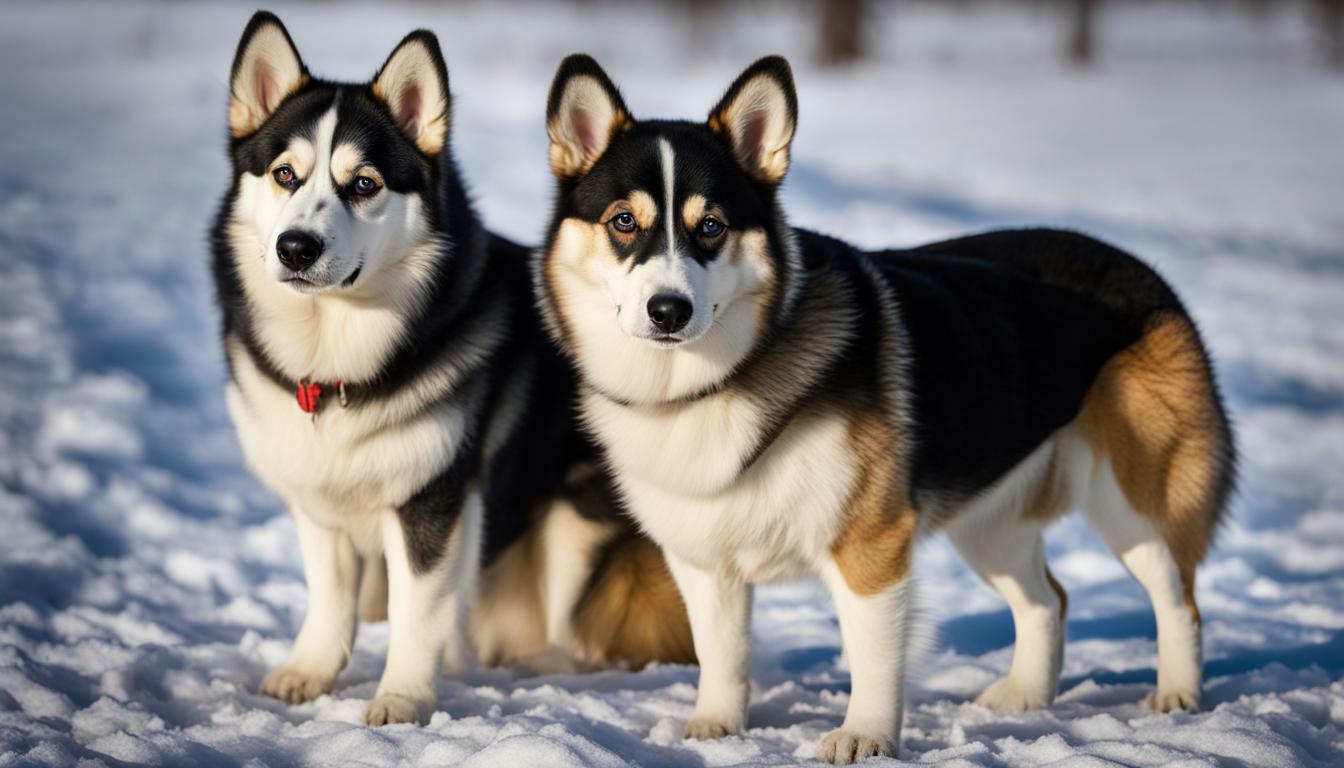When considering a dog breed for your family, it’s crucial to find one that matches your lifestyle and is suitable for children.
Meet the Husky and the Corgi, two popular dog breeds that are known for their unique characteristics and charm. In this article, we will explore the similarities and differences between these breeds to help you make an informed decision on the best pet for you and your family.
Both Huskies and Corgis are beloved for their loyalty and love for their families. However, they have distinct differences in terms of temperament, size, exercise needs, and grooming requirements.
Huskies are known for their friendly and affectionate nature, but they require lots of exercise and mental stimulation to thrive. On the other hand, Corgis are valued for their loyalty and intelligence, but they can be stubborn and have high exercise needs.
Size-wise, Huskies are larger dogs, known for their striking appearance and majestic presence. Corgis, on the other hand, are smaller in size but equally charming, with their adorable short legs and expressive faces.
In terms of grooming, Huskies have a thick double coat that requires regular brushing and shedding management. Corgis, with their medium-length coats, also require consistent grooming to keep their fur in good condition.
When it comes to choosing between a Husky and a Corgi, it’s important to consider the specific traits and needs of each breed, as well as your family’s dynamics and home environment. Taking into account factors such as space availability, family members’ activity levels, and other pets in the household will help ensure a harmonious match.
Now that you have an overview of the Husky and Corgi breeds, it’s time to dive deeper into their individual characteristics and weigh the pros and cons. In the following sections, we will explore each breed’s temperament, size, exercise needs, grooming requirements, and more, to help you make the best choice for your family.
Similarities and Differences between Huskies and Corgis
Huskies and Corgis have unique characteristics that set them apart, but they also share some similarities. When comparing these two popular dog breeds, it’s important to consider their temperaments, sizes, exercise needs, and grooming requirements.
Starting with their temperaments, both Huskies and Corgis are known for their loyalty and affection towards their families. However, Huskies tend to be more independent and strong-willed, while Corgis are generally more eager to please and obedient. Additionally, Huskies have a reputation for being vocal and sometimes prone to escaping, while Corgis are less likely to exhibit these behaviors.
In terms of size, Huskies are medium to large-sized dogs, weighing between 35 to 60 pounds, while Corgis are smaller, typically weighing around 25 to 30 pounds. This size difference can be a factor to consider if you have limited space or if you prefer a smaller dog that is easier to handle.
| Breed | Average Weight |
|---|---|
| Husky | 35-60 pounds |
| Corgi | 25-30 pounds |
Regarding exercise needs, both Huskies and Corgis are active breeds that require regular physical activity. Huskies, being originally bred as sled dogs, have high exercise requirements and thrive in homes with spacious yards or a daily exercise routine. Corgis, on the other hand, also need regular exercise but can adapt well to different living environments, including apartments.
When it comes to grooming, Huskies have a thick double-coat that requires regular brushing to maintain its health and manage shedding. Corgis also have a double-coat but shed less compared to Huskies. Both breeds may experience seasonal shedding, and occasional bathing and nail trimming are essential for proper grooming.
Summary
When comparing Huskies and Corgis, it’s important to consider their temperaments, sizes, exercise needs, and grooming requirements. Huskies are known for their independence, vocal nature, and high exercise needs, while Corgis are more obedient, less vocal, and adaptable to different living environments. Huskies are medium to large-sized dogs, weighing between 35 to 60 pounds, whereas Corgis are smaller, weighing around 25 to 30 pounds. Both breeds require regular exercise, but Huskies have higher energy levels. Grooming-wise, Huskies have a thicker coat and shed more, while Corgis have a double-coat with less shedding. By understanding these similarities and differences, you can make an informed decision about which breed is the best fit for your family and lifestyle.
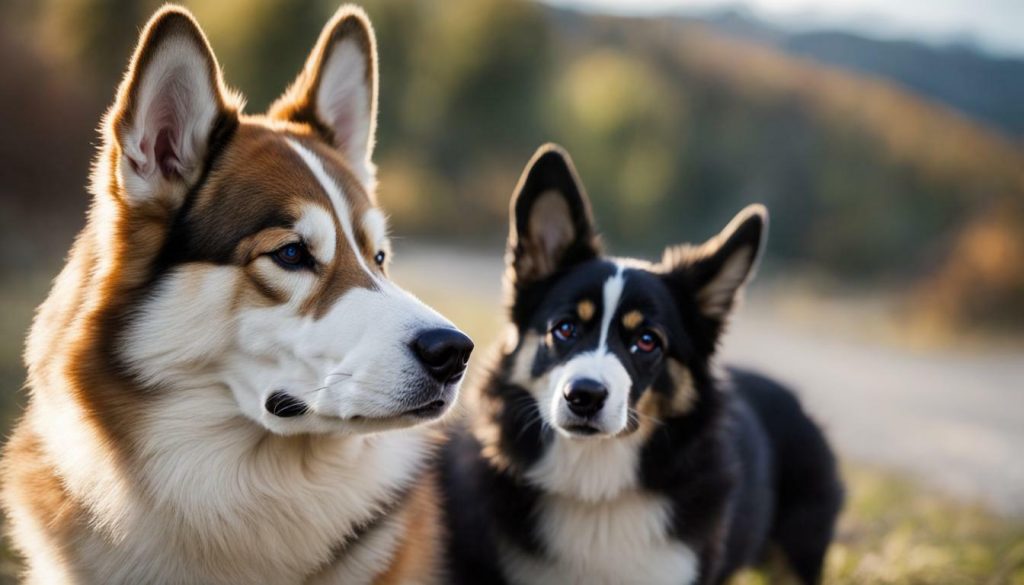
Understanding the temperament of Huskies and Corgis is essential in determining which breed might be a better fit for your family.
Huskies are known for their friendly and affectionate nature. They are extremely loyal to their families and love spending time with them. However, it’s important to note that Huskies are also independent and have a strong prey drive. They can be quite stubborn and require consistent training to prevent them from becoming too dominant. Huskies are typically good with children, but their energy levels and size may require supervision during playtime. Additionally, Huskies are known for their vocal nature and can be quite talkative, which may not be suitable for all households.
Corgis, on the other hand, are known for their intelligence and loyalty. They are highly trainable and eager to please, making them great family pets. Corgis are good with children and other animals, and they often form strong bonds with their family members. However, Corgis can be stubborn at times and may require patience and consistent training. While they are generally not as vocal as Huskies, Corgis can still bark to alert their family members of potential threats. It’s important to engage them in regular mental and physical exercise to prevent boredom and potentially destructive behavior.
When deciding between a Husky and a Corgi, consider your family’s needs and lifestyle. If you are an active family who enjoys spending time outdoors and can provide ample exercise and mental stimulation, a Husky may be a good match. On the other hand, if you are looking for an intelligent and loyal companion who is slightly more adaptable to a smaller living space, a Corgi may be a better fit. Always remember to research and understand the specific characteristics and needs of each breed before making a decision.
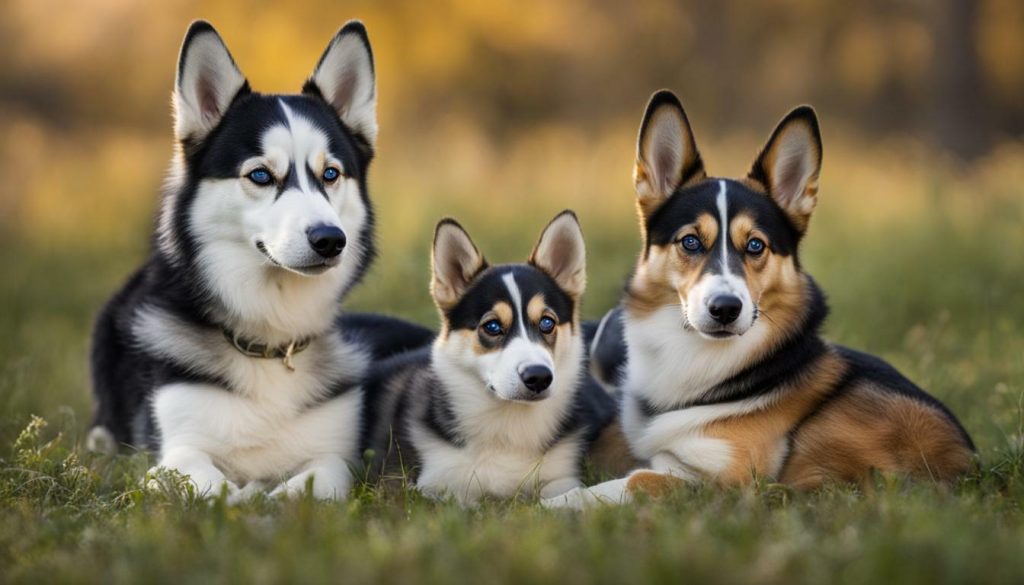
| Characteristics | Huskies | Corgis |
|---|---|---|
| Temperament | Friendly, independent, talkative | Intelligent, loyal, occasionally stubborn |
| Size | Medium to large | Small to medium |
| Exercise Needs | High | Moderate |
| Grooming Requirements | High | Moderate |
| Compatibility with Children | Good | Good |
| Trainability | Moderate | High |
Size Comparison: Huskies and Corgis
When it comes to size, Huskies and Corgis have distinct differences that may influence your decision. Huskies are classified as a large breed, typically weighing between 35 to 60 pounds and standing at a height of 20 to 24 inches at the shoulder. On the other hand, Corgis are considered a small breed, with an average weight of 25 to 30 pounds and a height of around 10 to 12 inches.
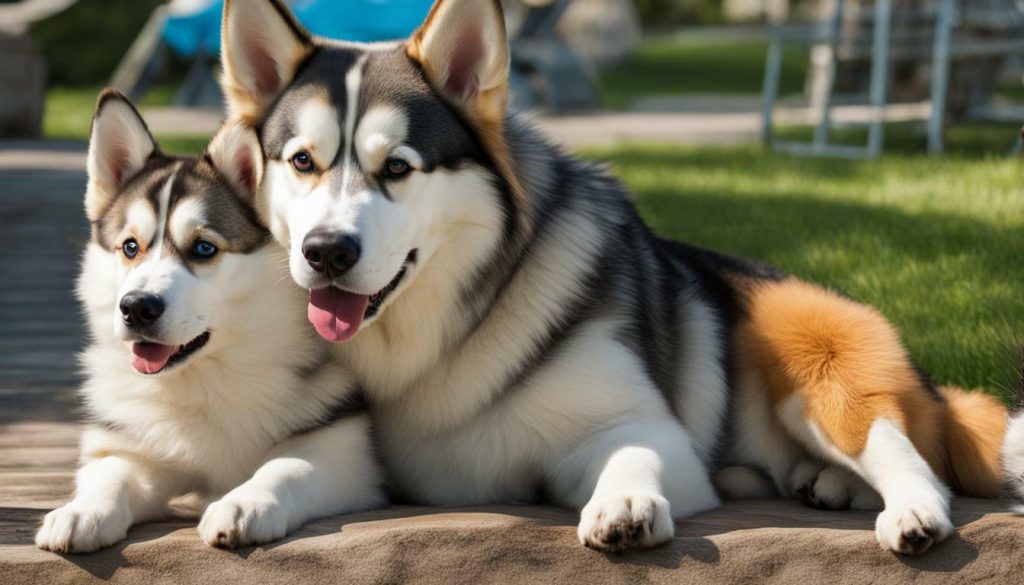
Despite their size differences, both breeds have a sturdy and muscular build. While Huskies may appear larger and more imposing, Corgis have a unique body shape with short legs and a long body. Their compact size makes them suitable for smaller living spaces and easier to handle, especially for families with young children.
Husky Size:
| Weight Range | Height Range |
|---|---|
| 35-60 pounds | 20-24 inches |
Corgi Size:
| Weight Range | Height Range |
|---|---|
| 25-30 pounds | 10-12 inches |
“Huskies may appear larger and more imposing, but Corgis have a unique body shape with short legs and a long body.”
Considering the size differences, it’s important to evaluate your living conditions and space availability before making a choice. If you live in a smaller apartment or have limited outdoor space, a Corgi might be a better fit due to their smaller size and lower exercise requirements. However, if you have a larger home and ample outdoor space, a Husky could thrive with the extra room to run and explore.
Remember that size is just one aspect to consider when choosing the right dog breed for your family. Temperament, exercise needs, grooming requirements, and compatibility with children and other pets should also be taken into account. By carefully assessing the traits and needs of both Huskies and Corgis, you can make an informed decision that aligns with your family’s lifestyle and preferences.
Exercise Needs: Huskies and Corgis
Keeping Huskies and Corgis happy and healthy involves meeting their specific exercise requirements. These energetic breeds thrive on physical activity and mental stimulation. Let’s take a closer look at the exercise needs of Huskies and Corgis to help you determine which breed is the best fit for your family.
Exercise Intensity
Both Huskies and Corgis are active breeds that require regular exercise to maintain their physical and mental well-being. However, Huskies have higher energy levels and a stronger drive for exercise compared to Corgis. They originated as working dogs and were bred to pull sleds over long distances. As a result, Huskies need vigorous exercise, such as running, hiking, or playing fetch, for at least 1-2 hours each day. On the other hand, Corgis, although active, have a more moderate exercise requirement and typically need around 30-60 minutes of daily activity.
Exercise Variety
Both Huskies and Corgis benefit from a variety of exercise options to prevent boredom and keep them mentally stimulated. Huskies enjoy activities that tap into their natural instincts, such as backpacking, agility training, or participating in dog sports like canicross. Corgis, being herding dogs, excel in activities that allow them to use their intelligence and problem-solving skills, such as obedience training, puzzle toys, or herding trials. It’s important to provide a mix of physical and mental exercises for both breeds to ensure their overall well-being.
Exercise Safety
When engaging in physical activities with your Husky or Corgi, it’s essential to prioritize their safety. Both breeds should always be kept on a secure leash or in a securely fenced yard, as they have a strong prey drive and may be prone to chasing after small animals. Additionally, avoid exercising them in extreme weather conditions, as Huskies are more tolerant of cold temperatures, while Corgis may struggle in hot and humid weather. Keeping their exercise routines safe and comfortable will contribute to their overall happiness and health.
| Exercise Needs | Husky | Corgi |
|---|---|---|
| Duration | 1-2 hours daily | 30-60 minutes daily |
| Intensity | High | Moderate |
| Ideal Activities | Running, hiking, playing fetch, backpacking, agility training | Obedience training, puzzle toys, herding trials |
In conclusion, both Huskies and Corgis have exercise needs that require commitment and dedication from their owners. While Huskies demand more intense and extended physical activities, Corgis require less but still benefit from mental stimulation. Understanding and meeting these exercise requirements will contribute to a happy and healthy life for your furry companion. Take the time to assess your family’s lifestyle, available time, and energy levels to determine which breed is the best fit for your exercise routines and overall compatibility. Remember, a well-exercised dog is a happy dog!

Understanding the grooming demands of Huskies and Corgis is essential for keeping them looking and feeling their best. While both breeds have their unique grooming needs, taking proper care of their coat and overall hygiene is crucial to ensure their well-being.
Huskies: Huskies have a dense double coat that requires regular brushing to remove loose hair and prevent matting. They typically shed heavily twice a year, also known as “blowing their coat,” during which extra brushing is necessary to manage the shedding. Additionally, Huskies should be bathed only when necessary to maintain the natural oils in their coat. Regular nail trims and ear cleaning are essential parts of their grooming routine.
Corgis: Corgis have a medium-length double coat that also requires regular brushing to prevent matting and remove loose hair. They shed moderately throughout the year, with heavier shedding periods during seasonal changes. Corgis should be bathed when needed, but not excessively, to avoid drying out their skin. Regular nail trims and ear cleaning should be included in their grooming routine as well.
| Grooming Requirements | Huskies | Corgis |
|---|---|---|
| Coat Type | Double coat, dense and shedding heavily | Double coat, medium length and moderate shedding |
| Brushing Frequency | Regular brushing, particularly during shedding seasons | Regular brushing to prevent matting and remove loose hair |
| Bathing Frequency | Only when necessary to maintain natural oils | As needed, avoiding excessive bathing |
| Nail Trimming | Regular nail trims as part of grooming routine | Regular nail trims as part of grooming routine |
| Ear Cleaning | Regular cleaning to prevent infections | Regular cleaning to prevent infections |
Both Huskies and Corgis benefit from regular grooming sessions, not only for their physical appearance but also for their overall health. Establishing a grooming routine early can help them become comfortable with the process and ensure their coat stays healthy and free from tangles and matting. It’s important to pay attention to their specific needs and consult with a professional groomer if needed, especially during shedding seasons or if you are unsure about proper grooming techniques.
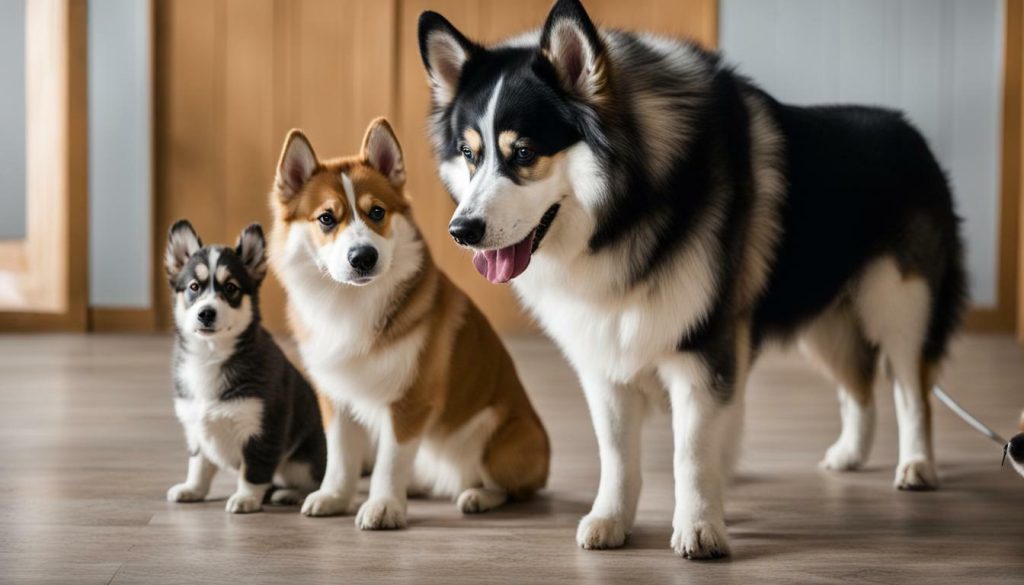
In conclusion, grooming plays a significant role in the overall well-being of both Huskies and Corgis. By understanding their coat types and specific grooming requirements, you can keep them looking their best and maintain a healthy bond with your furry companions.
Considering Your Family and Home Environment
To make the best choice between a Husky and a Corgi, it’s crucial to evaluate how each breed’s traits and needs align with your family and home environment. Both breeds have distinct characteristics that may or may not suit your lifestyle and living situation.
Huskies are known for their high energy levels and need for plenty of exercise. They require regular physical activity, such as long walks or runs, to keep them mentally and physically stimulated. If you have an active family who enjoys outdoor activities and has a large backyard for the dog to run around in, a Husky may be a good fit for you. However, it’s important to note that Huskies can be escape artists, so a securely fenced yard is a must.
Corgis, on the other hand, are smaller in size and require less exercise compared to Huskies. They are still an energetic breed that enjoys daily walks and playtime, but they are generally more adaptable to different living situations. Corgis are well-suited for families who have a moderate activity level and a smaller living space, such as an apartment or a house with a smaller yard. They are also known for their loyalty and make great family companions.
| Husky | Corgi |
|---|---|
| High exercise needs | Moderate exercise needs |
| Escape-prone | Adaptable to different living situations |
| Requires a secure, fenced yard | Can thrive in smaller living spaces |
When considering a Husky or a Corgi, it’s important to think about your family dynamics as well. Both breeds can be good with children, but they have different temperaments. Huskies are generally friendly and affectionate, but they can be boisterous and may not be suitable for families with very young children. Corgis, on the other hand, are known for their intelligence and loyalty, which can make them great companions for children of all ages.
Ultimately, the decision between a Husky and a Corgi should be based on your family’s lifestyle, activity level, available space, and ability to meet the breed’s specific needs. Take the time to research and understand each breed’s traits and requirements, and consider consulting with a reputable breeder or rescue organization to ensure you make the best choice for your family and home environment.

Huskies offer many positive attributes, but it’s important to consider the potential downsides before making a decision. These dogs are known for their beautiful appearance and striking blue or multi-colored eyes, which make them truly stand out. They are also incredibly loyal and affectionate, forming strong bonds with their families. Huskies are generally good with children, making them a great choice for families looking for a playful and loving companion for their kids.
However, owning a Husky requires a lot of commitment and effort. One of the main considerations is their high exercise needs. Huskies are an active breed that thrives on physical activity. They were originally bred as sled dogs, so they have a strong instinct to run and explore. Without adequate exercise, Huskies can become destructive and develop behavioral issues. Daily long walks, runs, or other vigorous activities are necessary to keep them happy and mentally stimulated.
Another aspect to consider is their tendency to escape. Huskies are notorious for their escape artist skills and can find ways to get out of even the most secure enclosures. They are intelligent and independent, making them experts at finding weaknesses in fences or gates. Proper containment and supervision are crucial to prevent them from running away.
Lastly, Huskies are known for their vocal nature. They are not a quiet breed and tend to howl, bark, and “talk” a lot. This can be quite entertaining for some owners, but it may not be suitable for those living in close proximity to neighbors or in shared living spaces.
| Pros | Cons |
|---|---|
| Beautiful appearance | High exercise needs |
| Loyal and affectionate | Tendency to escape |
| Good with children | Vocal nature |
What Others Say:
“Huskies are incredibly loving and playful. They have a unique personality and are always up for an adventure.” – Sarah, Husky owner
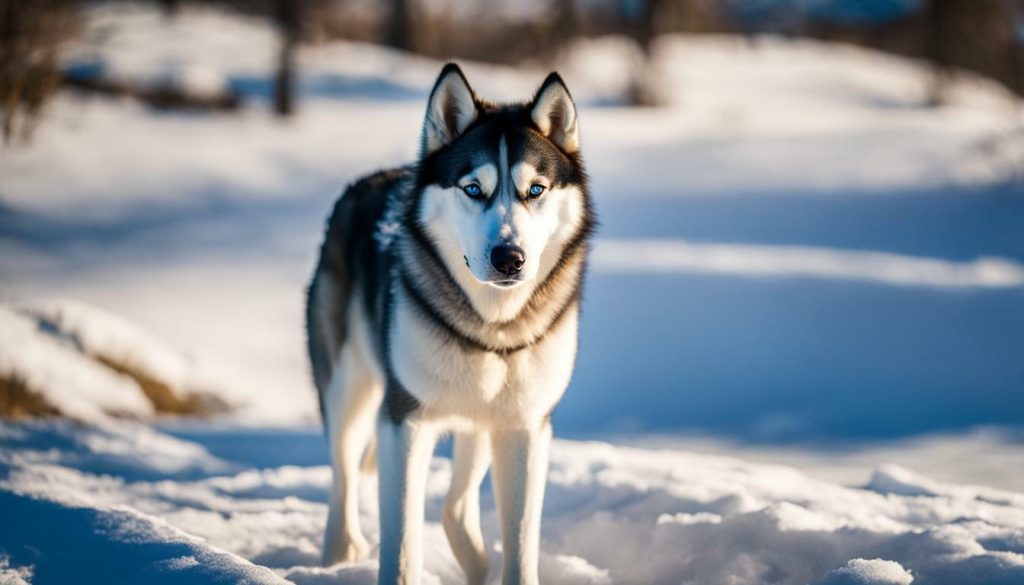
Corgis have several appealing qualities, but it’s important to weigh the potential drawbacks before committing to this breed. Known for their loyalty and intelligence, Corgis make excellent companions and are often great with children. They have a playful and friendly disposition, making them a popular choice for families.
One of the major advantages of owning a Corgi is their size. They are small dogs, which makes them suitable for apartments or homes with limited space. Corgis are also relatively low-maintenance when it comes to grooming, as their coat is short and easy to care for. They are known to be a generally healthy breed, which can save on vet bills in the long run.
However, it’s worth noting that Corgis have high exercise needs. They are an active breed that requires regular physical activity to stay happy and healthy. Without enough exercise, they may become bored and develop behavioral issues. Corgis are also prone to obesity, so it’s important to provide them with a balanced diet and monitor their weight.
In summary, Corgis are loyal and intelligent companions that can thrive in the right environment. They are great for families looking for a small and friendly dog, but it’s important to meet their exercise needs and be prepared for their high energy levels. With proper care and attention, a Corgi can bring joy and happiness to your family.
| Pros | Cons |
|---|---|
| 1. Loyal and intelligent | 1. High exercise needs |
| 2. Playful and friendly | 2. Prone to obesity |
| 3. Suitable for small living spaces | |
| 4. Low-maintenance grooming | |
| 5. Generally healthy breed |
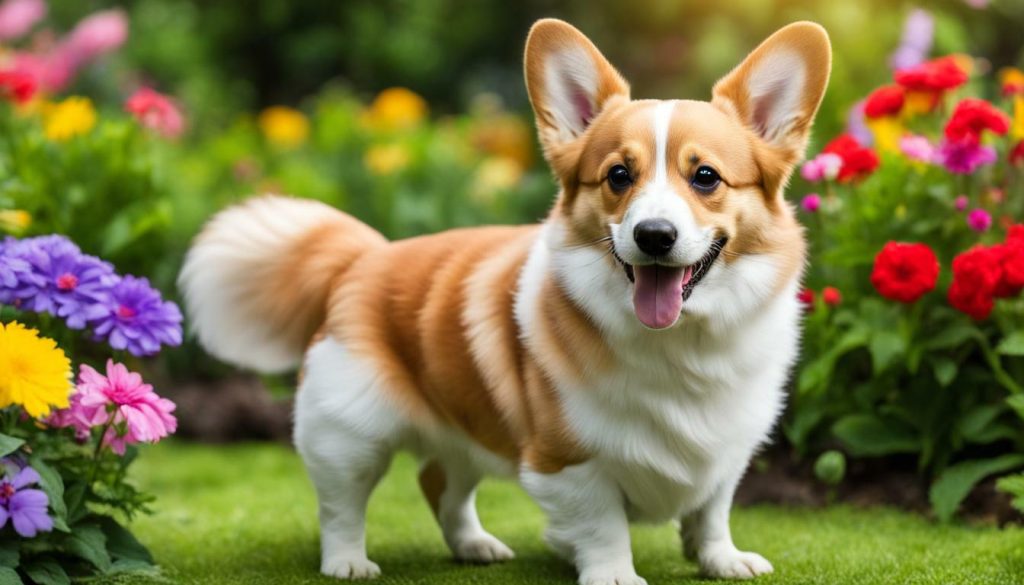
When it comes to choosing between a Husky and a Corgi, careful consideration of their individual characteristics and your family’s lifestyle is essential in making the best choice. Both breeds have their own unique traits and requirements that may influence your decision.
Huskies are known for their loyalty and love for family. They can be friendly and affectionate, making them great companions. However, it’s important to note that Huskies have high exercise needs. They are energetic dogs that require plenty of physical activity to keep them mentally stimulated and prevent destructive behaviors. Huskies are also known for their tendency to escape, so a secure and well-fenced yard is crucial. If you have an active family who enjoys outdoor activities and can provide the time and energy for consistent exercise, a Husky may be a good fit for you.
Corgis, on the other hand, are known for their loyalty and intelligence. They are incredibly devoted to their families and are quick learners. However, Corgis can be stubborn at times and may require patient and consistent training. They also have high exercise needs and thrive in an environment where they receive ample physical activity. If you’re looking for an intelligent and loyal companion who is good with kids but can also keep up with an active lifestyle, a Corgi might be the perfect addition to your family.
Ultimately, the choice between a Husky and a Corgi should be based on your family’s specific needs and preferences. Consider factors such as your activity level, available space, and the amount of time you can commit to exercise and training. Researching each breed thoroughly and understanding their temperaments, exercise needs, and grooming requirements will help you make an informed decision that will lead to a happy and harmonious relationship with your new furry family member.
FAQ
Q: What are some important factors to consider when choosing a dog breed for your family?
A: It’s important to consider factors such as your lifestyle, the presence of children in the family, and the specific needs and traits of the breed.
Q: Are Huskies good with kids?
A: Huskies are known for their loyalty and love for family, but they require lots of exercise and can be destructive if not properly stimulated.
Q: Are Labradors good family dogs?
A: Labradors make great family dogs as they are friendly, energetic, and easy to train.
Q: Are Pit Bulls good with people?
A: Pit bulls are known for their friendly personalities and love of people, but they require a lot of exercise and training.
Q: Are Beagles good for outdoor-loving families?
A: Beagles are great for outdoor-loving families.
Q: Are Golden Retrievers good with kids?
A: Golden Retrievers are friendly, good with kids, and love spending time with people.
Q: Are German Shepherds adaptable to any lifestyle?
A: German Shepherds are versatile and intelligent dogs that can adapt to any lifestyle, but they require plenty of exercise and socialization.
Q: Are Bulldogs protective family companions?
A: Bulldogs can be loyal and protective family companions, but they can easily overheat and need moderate exercise.
Q: Are Yorkshire Terriers good companions for families with children?
A: Yorkshire Terriers are small and make great companions for families with children.
Q: Are Pugs laid-back dogs?
A: Pugs are gentle and laid-back, but they require moderate exercise and can have health issues.
Q: How do Huskies compare to Corgis?
A: When comparing Huskies and Corgis, it’s important to consider their specific traits, needs, and how they fit into your family and home environment.
Q: What are the traits and needs of Huskies?
A: Huskies can be friendly and affectionate, but they require lots of exercise, can be noisy, and are prone to escaping.
Q: What are the traits and needs of Corgis?
A: Corgis are known for their loyalty and intelligence, but they can be stubborn and have high exercise needs.
Q: How do Huskies and Corgis compare in terms of temperament?
A: Huskies and Corgis have different temperaments, with Huskies being more affectionate and Corgis being more independent and stubborn.
Q: How do Huskies and Corgis compare in terms of size?
A: Huskies are larger dogs, while Corgis are smaller in size.
Q: What are the exercise needs of Huskies and Corgis?
A: Huskies and Corgis have different exercise needs, with Huskies requiring more exercise to keep them physically and mentally stimulated.
Q: What are the grooming requirements of Huskies and Corgis?
A: Huskies and Corgis have different grooming requirements, with Huskies needing more frequent brushing due to their thick coats.
Q: How can I choose between a Husky and a Corgi for my family?
A: It’s important to research and understand the specific needs and traits of each breed, as well as consider your family dynamics and home environment.
